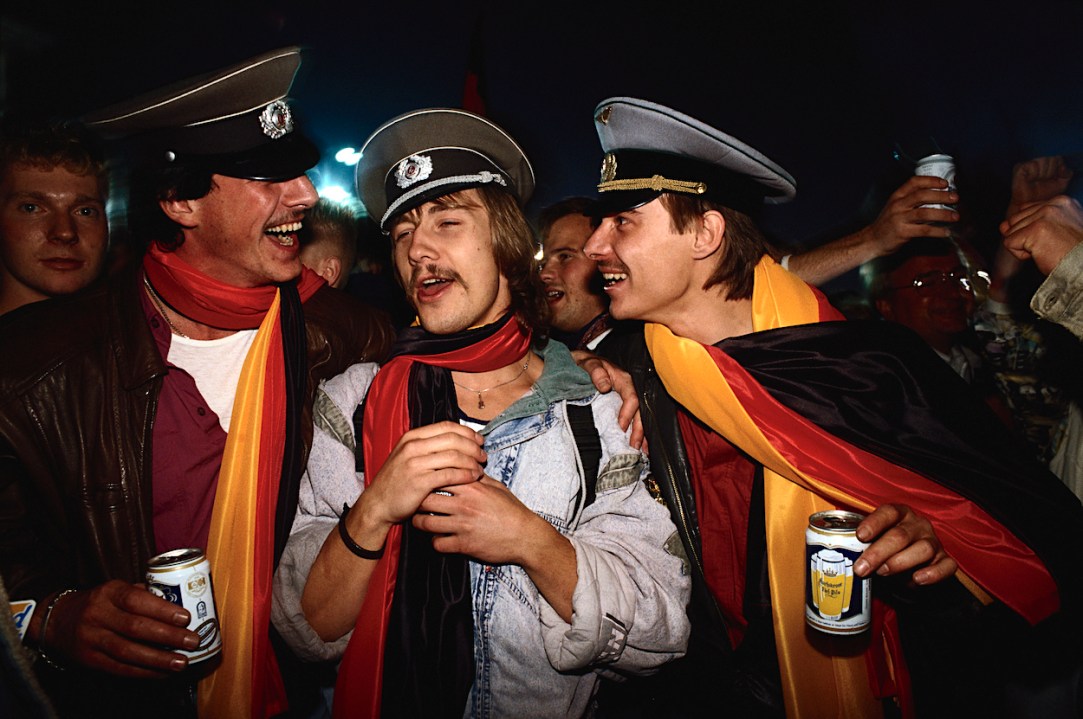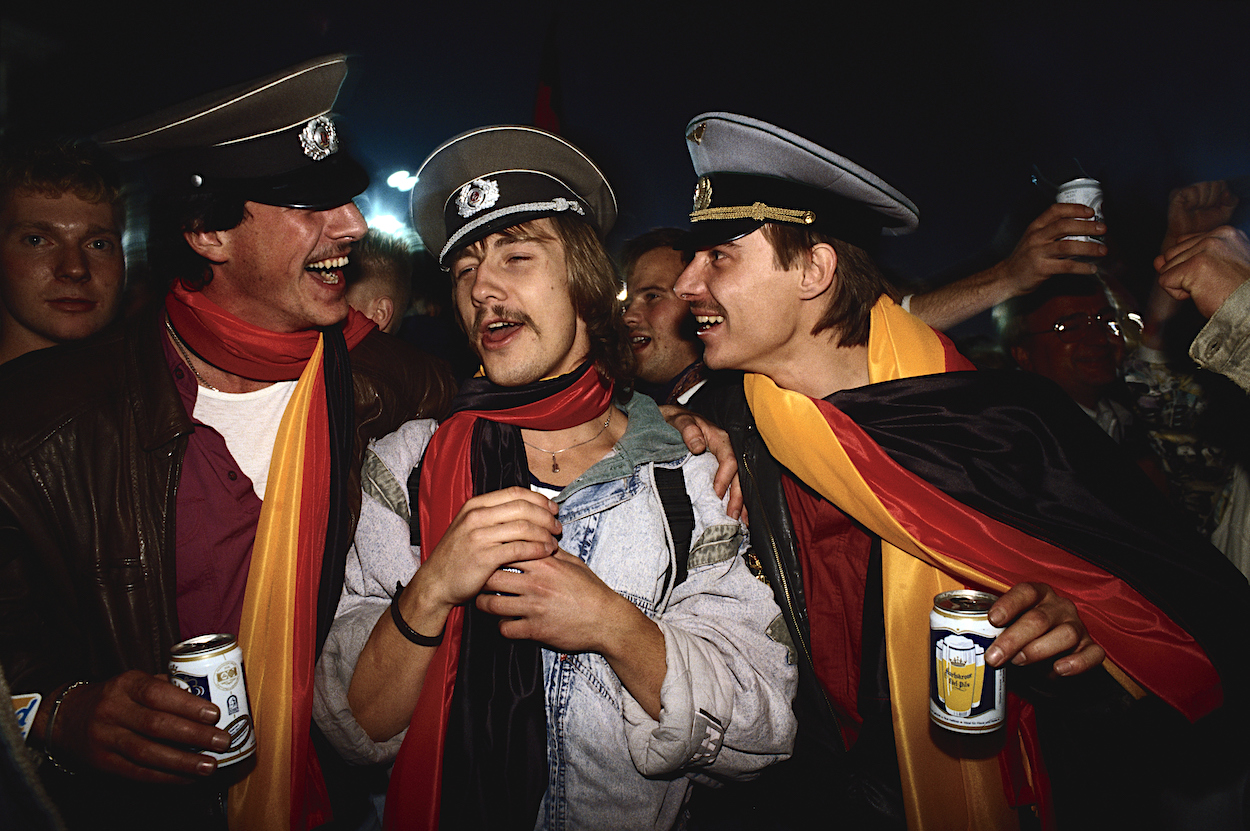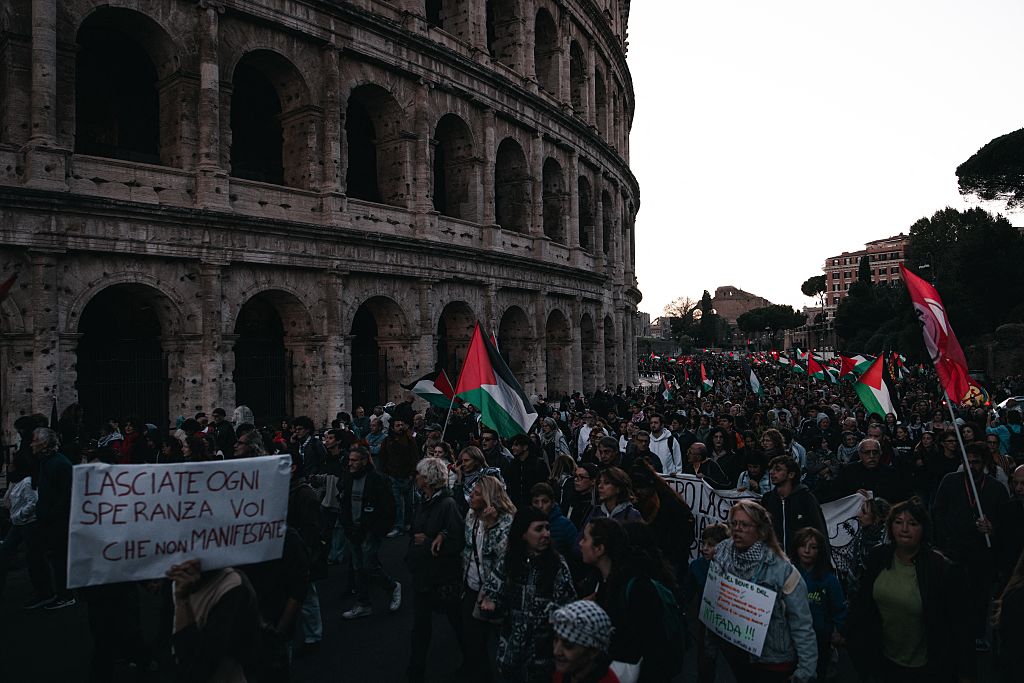It’s not easy for Germany to celebrate itself. But on Friday, the country tried. At the official celebration festivities for the Day of German Unity, the city of Saarbrucken near the French border hosted musicians, breakdancers, acrobats, magicians, and oddly, two actors dressed as a ‘talking sofa’ to entertain visitors.
Frank-Walter Steinmeier, the official head of state of the Federal Republic, spoke, alongside Chancellor Friedrich Merz. French President Emmanuel Macron also took part, to underscore the European dimension of Germany’s reunification. Notably, Angela Merkel, the only chancellor born in East Germany, and Joachim Gauck, the only federal president from the former communist ‘new states’, were not present – absences that highlight how Germany is still very much dominated by people from the west.
It’s just as well that the annual recognition of German reunification was located in Saarland. The tiny western state – the host because it holds the rotating presidency of the Bundesrat chamber of parliament – is about as far away from the former Berlin Wall and the volatile east as you can get in Germany.
Back in the capital, a monument designed to pay tribute to the ‘Peaceful Revolution’ remains a construction site nearly two decades after it was authorised. Symbolic of Germany’s woes, there have been legal, technical and financial issues, but at the end of the day, the unfinished site is a victim of Germany’s conflicted relationship with reunification and itself.
In the 35 years since, the differences between the two Germanies are still pronounced, and instead of a testament to victory in the Cold War, Germany’s national holiday has become a reminder of how the West has lost its way.
Unlike any other country, the Federal Republic of Germany was a construct of postwar US power. Moulded into a liberal-democratic showcase and set against the repression and struggle in the Soviet-controlled east, West Germany’s Wirtschaftswunder was not just an economic miracle, but a projection of the West, proof that the ideological construct built around free markets and free individuals worked.
But when the wall came down in November 1989, reunification was less a merging of equals than an annexation. East Germany’s institutions, identity, and sense of self were rapidly dismantled, replaced with the rules and assumptions of West Germany. The collapse of livelihoods was followed by a collapse of meaning. Where Helmut Kohl once envisioned ‘bluhende Landschaften’ (blossoming landscapes), what took root instead was alienation – a sense of being absorbed into a new order but never fully accepted. For East Germans, westernism wasn’t freedom, but subjugation in a different form.
Even in terms of material comfort, the east hasn’t caught up. The new Germans still earn 17 per cent less than counterparts in the west and in terms of assets, households in the west are more than twice as wealthy as people in the east, where the population has shrunk by 2.4 million people, mainly from fleeing youth, making the region older than the rest of the country.
Often dismissed as Jammer Ossis (whining easterners), grievances have festered and political expression increasingly takes the shape of ethnic nationalism.
More than one in three voters in the east support the far-right Alternative fur Deutschland (AfD), which has successfully tapped into that feeling of alienation over the way reunification plunged families and communities into precarity and invalidated customs and personal achievements.
In the west – where AfD support is growing, but still half as strong – there is bewilderment at why reunification did not deliver harmony.
For the country as a whole, the fractures are not only economic, they are existential. Despite hundreds of billions of euros available to stimulate the economy, Merz’s coalition is already sputtering after just five months as it struggles to motivate a fragmented electorate. It’s a function of politics and the people drifting apart, and the divide is threatening the viability of the country’s democracy.
‘The appeal of what we call the free West is noticeably waning,’ Merz said in his speech in Saarbrucken, calling on Germans to rally together and revive national unity. ‘It is no longer a given that the world will follow our lead, that our values of liberal democracy will be emulated, or that we, as part of the free West, will have the opportunity to change the world for the better.’
Seen in this light, Germany is a mirror of the wider West. After the Cold War, the ‘end of history’ was declared, but the people and how they fit into the system were treated as an afterthought.
Germany is no longer the coddled child of liberalism
Eastern Europe became a pool of cheap labour, Russia a resource frontier, and China a workshop. The assumption was that culture and belonging would dissolve before the universal solvent of liberal capitalism. It was hubris of the highest order. Instead of the West shaping the world in its image, neglected identities resurfaced, often in distorted and radical forms.
Across much of the West, the political centre is no longer the sturdy oak of stability it once imagined itself to be. In Germany, populist movements have unsettled the status quo by giving voice to voters uneasy about migration, globalisation and what these developments mean for national identities.
Quicker on their feet than the ponderous parties of the establishment, these political entrepreneurs have capitalised on a sense that politics has stopped listening. Those once regarded as reliable custodians of power would now struggle to inspire support for a plan, even if they had one.
In Britain, Nigel Farage’s Reform, if opinion polls are right, is poised to break the Conservative-Labour duopoly – showing that Brexit was not, in fact, the end of the argument. In France, Marine Le Pen’s National Rally continues to gain ground, testing the limits of mainstream acceptance while keeping the country’s political debates on edge. Italy’s Giorgia Meloni has spent three years in office proving that ‘outsider’ parties don’t always remain outside for long.
As the West struggles to defend its global standing, Germany is no longer the coddled child of liberalism, but rather the clearest reminder of how sweet victory curdled into defeat. Reunification has become not a heroic story of solidarity and integration, but a morality tale over the dangers of neglecting the people that liberal democracy is supposed to serve.
In Saarbrucken, Germany and Europe’s elites revelled in what has been achieved – and to be sure, there have been successes. But leave no doubt, the anniversary of reunification is less a celebration, more a warning.








Comments